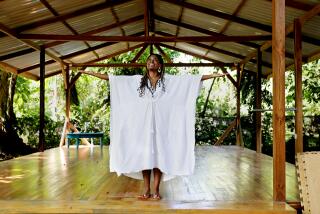Peace Corps Rigors Lure Woman from Privileges
- Share via
NEWBURY PARK — The young woman’s house is a sprawling suburban place a block away from parkland dominated by majestic Santa Monica Mountains. Her neighborhood is a patchwork of such modern, airy homes and is quiet, neat, white, prosperous, orderly, safe, unrelentingly pleasant.
She grew up here. Attended St. Julie Billiart Church. Went to public schools, was a student government big. Then left for the University of California at Riverside. She majored in business.
Unlike many who first experience life away from home, she was one of those students who held on to who she was while growing up. She joined the Catholic Newman House near campus, attended Mass on Sunday and prayer meetings during the week. She pulled back on the student government thing but kept some comforts and old habits. She had a car. She studied hard and got good grades.
Like so many of her age and predilection, she spent a fair amount of energy each day maintaining her look: two curling irons, the right makeup, the right clothing. Her idea of a big night out was dinner at a hole-in-the-wall Riverside bistro with her boyfriend of nearly four years. They’d have a bottle of red, fried calamari, pasta with pesto, dessert of Ben & Jerry’s peanut butter and chocolate, cookie dough chocolate ice cream.
On the face of it, this was shaping up to be The Perfect Life.
That’s when Jennifer Rupp, now 22, got radical. Or sort of.
She leaves this month for Bamako, Mali, a small republic in French West Africa. She’ll live there for two years.
No running water. No electricity. No big houses.
No long baths. No curling irons. No mattress and box-spring.
More to the point, there’s plenty of malaria and Africa’s wildly escalating HIV infection rate, estimated in some regions to involve 40 percent of the population.
Rupp has joined the Peace Corps.
Remember that?
The Peace Corps was, in its relevant zenith in the 1960s, the place for young Americans in a booming postwar America to place their booming altruism. Then came Vietnam, which lent the corps’s recruits an alternative, somewhat tie-dyed look. In any of its forms, though, the corps was always the outfit in which to do good, make a difference, build a better world.
The ‘90s are different. Forget the world for a minute. America’s got in-the-face problems.
Our cities crack under the pressure of ethnic strife. Our economies, local and national, heave and wheeze, searching for stasis more than wildfire growth. And our youngest and brightest college graduates compete for jobs in a shrunk, protean marketplace. Self-involvement is often the result, evolved from the political narcosis of college campuses in an overindulged 1980s to a worried, compulsive 1990s. Any way you cut it, there’s been so much me, me and me.
But Jennifer Rupp is not particularly worried about herself. Not in the conventional sense, anyway, which is why her behavior can be called radical.
She could have run headlong into the marketplace, likely competing successfully for a numbers job somewhere. Instead she’ll be advising Mali’s government-subsidized “entrepreneurs” on business efficiencies, organization, strategies for independence.
She could have decided to kick around for a while before, perhaps, deciding to go to grad school. Instead she’ll be doing 10-hour days for no pay as an alien: a conservative, white, middle-class American woman in a French-speaking black world of emerging literacy. Alone.
Is she wary? Yes. Is she humbled? You bet.
But ask her why she truly is doing this, and you won’t get a Catholic answer. It’s not just to help an emerging nation. It’s to help Jennifer Rupp.
“I guess I have something to prove to myself,” she says. “I am what I seem. I am conservative. I do like comforts. And I’ve never been anywhere. I just want to be sure that that’s not just who I am.”
Ask her what her greatest strength is, she’ll tell you, “Maybe I’ll find that out.”
Then, ask her what she thinks it will look like to pull up to her parents’ wonderful house here after two years amid impoverishment and risk, she’ll look you in the eye and say, “I think it will look as terrific and horrifying as Bamako will look to me this July.”
Don’t mind Rupp’s uncanny vision in these matters.
It’s just who she is.
More to Read
Sign up for Essential California
The most important California stories and recommendations in your inbox every morning.
You may occasionally receive promotional content from the Los Angeles Times.













